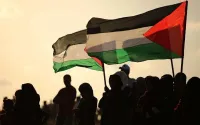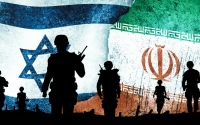Znet
Now, More Than Ever: A Global Movement for Global Justice
In the months before September 11, the Bush Administration undermined one effort after another to address world problems on an international basis. It skipped out on the Kyoto Protocol on global warming, scuttled efforts to control biological weapons, refused to support a war crimes tribunal, withdrew from efforts to limit nuclear proliferation, and announced withdrawal from the treaty against anti-ballistic missiles.
In contrast, a swelling global justice movement demanded adequate responses to problems ranging from genetically modified organisms to AIDS drugs for poor countries, from global warming to the destruction of indigenous lifeways by global corporations. While its most visible expressions were large global demonstrations in places like Quebec and Genoa, its real strength lay in its linkage of people at the grassroots around the world - its "globalization from below." This movement was mobilizing for massive demonstrations at the IMF/World Bank meetings in Washington, DC at the end of September.
The terrorist attacks on September 11 posed this movement new and unanticipated questions. In contrast to the Vietnam War, the Gulf War, or the bombing of Serbia, there was an attack on and a threat to the United States in reality, not just in the rhetoric of American leaders. To treat mass murder and war crimes committed on American soil as somehow equivalent to past resistance to American imperialism would have been grotesque and, at least for the movement in the US, suicidal.
Almost from day one, activists began improvising an appropriate response. They defined the attacks as criminal acts, not acts of war. They defined the appropriate response as mobilizing international law, not unilateral military violence. They opposed attacks that would harm people who had not committed the crime. They emphasized protection for those, including but not limited to Muslims and Arabs, who had almost immediately become the targets of bigotry and violence.
Over the course of two weeks, a peace movement calling for "justice not vengeance" emerged in the US. Its base included students, religious communities, peace activists, and many from the global justice movement. Similar movements have emerged around the world to oppose an accelerating cycle of violence. [for more information, visit www.indymedia.org, www.zmag.org, and sites linked to them.] Organizers cancelled the Washington demonstrations planned for late September, while going ahead with associated educational activities and initiating a major discussion about responses to the post-September 11 situation.
In the face of calls to equate vengeance with patriotism, it was easy to fear that the fragile unity of the broad coalitions that have challenged globalization in the US might rapidly turn into a battle between peacniks and warniks. Notwithstanding some divergences of response, that hasn't happened.
On the one hand, even those most critical of US imperialism have mourned the lost, condemned the terrorist attacks, and supported international cooperation to bring the perpetrators to justice. On the other hand, even trade unions with "hard hat" constituencies have largely rejected "bomb them back to the stone age" responses: The Steelworkers union's September 12th statement, for example, demands "justice for the victims, their families and humanity, and strongly urges that all available resources be used to track down and punish those individuals and organizations responsible," but warns that "care must be taken not to repeat this most recent tragedy by harming innocent men, women and children who, because of geography, find themselves in harm's way."
The Bush Administration now seems to be backing off from the threat of a Gulf War-style juggernaut. It's hard to weigh how much this results from the unlikelihood of success, the probable risks, other countries' objections, fear of war's impact on the deflating global economy, and the sheer irrationality of such an enterprise. Even without massive retaliation, millions of war-battered and desperately poor Afghanis have already fled their homes and been cut off from food aid as a result of the threat of US attacks. And the world still faces a "War on Terror" redolent of the "War on Drugs," with the US asserting its right to use military force against any country that doesn't accept whatever demands it chooses to make.
While no one in the Bush Administration has uttered the words "New World Order," at least in public, it's hard not to hear echoes of the past. George Bush, Senior's "New World Order," as I described it a decade ago, "aimed to create a consortium of powerful political regimes, corporations, and military establishments which would cooperate to preserve their access to the resources of the Earth, the products of past human activity, and the fruits of future labor. . . . The predictable consequences were repression of insurgencies and increasing concentration of wealth on a global scale."
The Bush Administration is already moving to make the new international coalition not just a coalition to protect against terrorists but also a coalition to protect against the critics of unrestrained economic globalization. In the wake of the September 11 attacks, US Trade Representative Robert Zoellick recalled that "Throughout the Cold War, Congress empowered presidents with trade negotiating authority to open markets, promote private enterprise and spur liberty around the world - complementing U.S. alliances and strengthening our nation." He called for new global trade negotiations and "trade promotion authority" (the pleasant-sounding new P.R. term for Fast Track). "America's trade leadership can build a coalition of countries that cherish liberty in all its aspects." People and governments around the world need to ask whether they are being signed up to fight terrorism, to promote US trade policy, or to initiate a new "New World Order."
Zoellick also absurdly and abusively linked the terrorist attacks on the US with opposition to US trade policy. "On Sept. 11, America, its open society and its ideas came under attack by a malevolence that craves our panic, retreat and abdication of global leadership. . . This president and this administration will fight for open markets. We will not be intimidated by those who have taken to the streets to blame trade - and America - for the world's ills." This is guilt-by-association without even an association.
The global justice movement blames neither trade nor American for the world' s ills. Rather, it is grounded in an understanding that no community or country can solve its economic problems by trying to beat out others - that the result of such competition is instead a race to the bottom in which all lose. It argues that the world's people and environment will suffer unless a global people's movement imposes rules on countries and corporations to block the destructive effects of that competition. It calls for worldwide cooperation to protect human and labor rights, the environment, and people's livelihoods.
This same kind of understanding must now be applied to global conflict. The September 11 attacks show that the era is over in which nation states - even the world's single military superpower - can protect their people. There is no longer such a thing as national security -- security must be global to be secure. Broad human interests require limits on the use of violence by anyone in the world, whether they initiate their attacks from caves in the wilderness or war rooms in national capitals. The so-recently-unilateralist President Bush's frenetic coalition-building is an implied tribute to this view: It reflects a recognition that even the US can't by itself deal with the real threats it faces.
The future remains uncertain. New attacks by either terrorists or the US are always possible. But we shouldn't assume that purveyors of violence will be able to monopolize public attention forever. The Oklahoma City bombing cornered national attention for a few weeks, then faded to just one more news story. George Bush, Senior's poll ratings were nearly as high after "victory" in Kuwait as George W. Bush's are today; a year later in the midst of a recession he was voted out of office. The Seattle demonstrations that kicked off the current phase of globalization from below came hard on the heels of "victory" in the bombing of Serbia.
Much as the Bin Ladens and the Bushes may have other ideas, the fundamental conflict in the world today remains globalization from above vs. globalization from below. If the Bush Administration sincerely seeks to bring the perpetrators of the September 11 attacks to justice without committing new crimes along the way it will receive worldwide support. If it tries to use the "War against Terrorism" as a cover for a new consortium of political regimes, military establishments, and private economic interests imposing their will on the world - a new "New World Order" -- it will find the ground crumbling beneath its feet.
* Jeremy Brecher is the author of Globalization from Below and Strike! and the producer of the video Global Village or Global Pillage? [www.villageorpillage.org].






